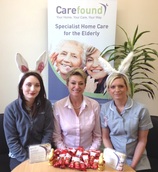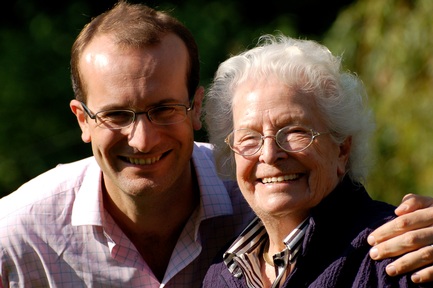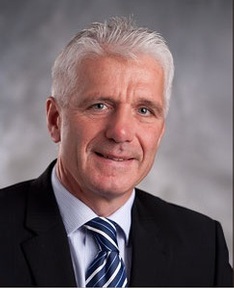Profile: founder of Carefound 'positive' about the future of the home care sector
After developing an interest in the elderly care sector while working for a London-based company that invests in specialist businesses and noticing a gap in the market, Oliver Stirk decided to move back to North Yorkshire and establish Carefound.

Prior to founding the company in late 2011, Mr Stirk spent a year researching the sector and found there was a growing need for community-based specialist care services for elderly people. He also noticed that most home care services were tailored to the needs of local authorities rather than the needs of the individual.
As a result he moved back to his hometown of Harrogate and set up Carefound, which provides specialist home and dementia care to elderly people in Harrogate, Ripon and Wetherby, enabling clients to live in their own homes while maintaining an independent lifestyle for as long as possible.
Carefound stands out from the crowd when it comes to the length of home care visits, with each visit lasting a minimum of an hour - many other providers have recently come under criticism for carers’ home visits being too short.
A survey by the United Kingdom Homecare Association last year found that in England, nearly three quarters (73 per cent) of homecare visits commissioned by councils are for periods of 30 minutes or less, with one in ten (10 per cent) visits commissioned for 15 minutes or less.
Speaking on the topic of home visits, Mr Stirk said: “I don’t actually think I am well placed to comment on why visits of less than an hour – even down to 15 minutes – are still common place across the sector. We don’t get involved in this debate and don’t really intend to.
“It’s obvious you can’t help someone on 15 minutes, by the time you have come in and said ‘hello’ this time is up.
“Obviously the principal driver of such short visits is the commissioning criteria of local authorities. However, our view is that complaining about this and entering into disputes with commissioners is a waste of time and money – efforts are much better focussed on developing specialist, innovative ways of working in this constrained environment that is not going to change for many years.”

Carefound is working with the Contented Dementia Trust to offer an innovative approach to specialist dementia care. When the two joined forces at the end of last year, Carefound adopted the Contented Dementia Trust’s SPECAL method, which aims to treat the condition as a disability rather than trying to ignore or defeat it.
The SPECAL method uses a unique way of understanding dementia and tries to see it from the point of view of the person with the condition. It starts with three simple ‘Golden Rules’: don’t ask questions, don’t contradict and learn from the expert (the person with dementia).
Currently Carefound does not work with local councils because Mr Stirk wants to keep the focus on “providing high quality care” rather than “logistics” but he would be willing to work with them in the future if more recognition is given to specialist services.
He said: “We are not against working with councils more closely, and actually believe that we will be able to do so as and when local authority commissioners are able to recognise specialist services more.”
Mr Stirk developed Carefound with the ethos ‘Your Home, Your Care, Your Way’ and is committed to providing the highest quality of care.
He said: “Everything we do is based on a commitment to providing the highest quality service to our clients according to their individual needs and the belief that this is only achievable through providing specialist care services.

“The result of this is not only that the families we support know we do everything we can to help them enjoy the highest quality of life achievable, but also that our home care team is empowered with the skills they need to make a genuine difference to their clients’ daily lives – this is hugely important in maintaining a compassionate, consistent, and motivated team.”
That “compassionate, consistent and motivated team” offers a variety of support, including basic home help, personal care and specialist dementia and respite care, something Mr Stirk is “most proud” of.
He said: “I am most proud of the service we provide to our clients and the feedback we receive from them. It’s a great feeling when you see that not only are you making a difference to an individual’s quality of life but also the people around them such as family and friends. This is particularly the case when supporting people with dementia who can experience significant benefits from specialist support tailored to their specific needs.
“I also get huge satisfaction from seeing our home care team in action during staff meetings and client review meetings – the detail they go into and the day-to-day issues they find solutions to is amazing.”
Speaking generally about the future of the home care sector, Mr Stirk said he is “positive” about what lies ahead despite increased pressures on funding and a rising demand from an ageing population.
He said: “If providers can modernise and adapt the way they operate to be more focussed on individual clients and families, including developing specialist expertise such as helping people with dementia, there is a huge opportunity to help people remain in the comfort of their own homes for longer.
“We don’t believe that home care will replace residential care, but if home care is commissioned properly and the industry can improve the service it offers, elderly people will be able to maintain independence in the community for longer and only be forced into 24-hour care residential care when they reach a ‘tipping point’ that requires a specialist residential environment.”
He also believes that working and communicating with people such as a client’s neighbour, GP or lawyer, as well as family members, will help the home care sector thrive in the future.
Speaking specifically about what the future holds for Carefound, Mr Stirk said: “We will continue to grow our home care and dementia care service in Yorkshire. This will however be limited to a size that allows us to maintain the excellent levels of care we currently provide.
“There will be opportunity to take the service to other locations where there is a demand for the service we provide.
“We are also keen to use the knowledge and experience I gained prior to Carefound to take our modern approach of providing affordable, quality care services to the assisted living model.
“As more people stay at home for longer and only move into residential care homes when they have more complex needs, I believe that the market for specially designed accommodation where people live in their own home but have support on-site when needed, will grow rapidly as has already happened in America.”
Interesting facts
First job: Selling ice creams at Newby Hall and Gardens
Favourite book: My World by Jonny Wilkinson
Favourite film: Ne le dis á personne (which translates as Tell No One)
Favourite piece of music: A Real Hero by College and Electric Youth
Best present: A signed birthday card from England rugby player Victor Ubogo
Last holiday: A week in Tuscany with family and friends
Latest Profiles News
 01-Aug-19
Deal or No deal: Boris Johnson must protect care workforce says home care chief
01-Aug-19
Deal or No deal: Boris Johnson must protect care workforce says home care chief
 04-Dec-15
Former John Lewis director reveals why his home care company is employee owned
04-Dec-15
Former John Lewis director reveals why his home care company is employee owned
 17-Jul-15
Being a home care worker gives you the opportunity 'to make a real difference to someone’s life'
17-Jul-15
Being a home care worker gives you the opportunity 'to make a real difference to someone’s life'
 04-Mar-15
Home Instead boss calls for 'radical change' saying social care and health must be integrated
04-Mar-15
Home Instead boss calls for 'radical change' saying social care and health must be integrated
 02-Dec-14
Profile: ‘We do not do 15-minute visits’ says managing director of Right at Home
02-Dec-14
Profile: ‘We do not do 15-minute visits’ says managing director of Right at Home